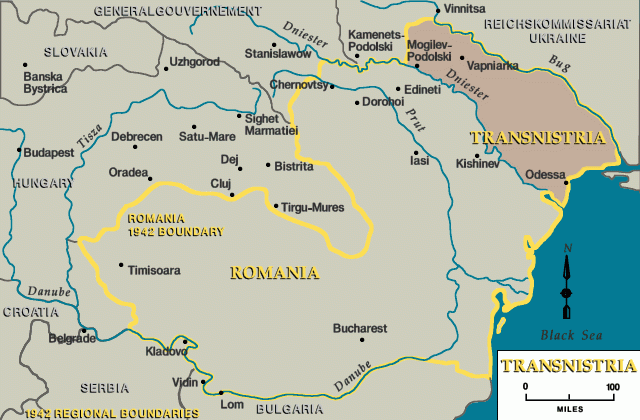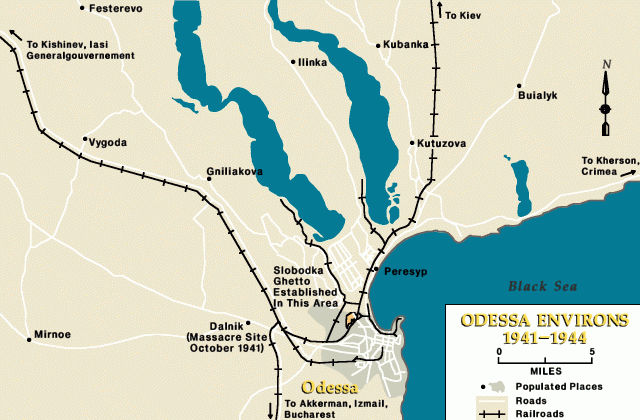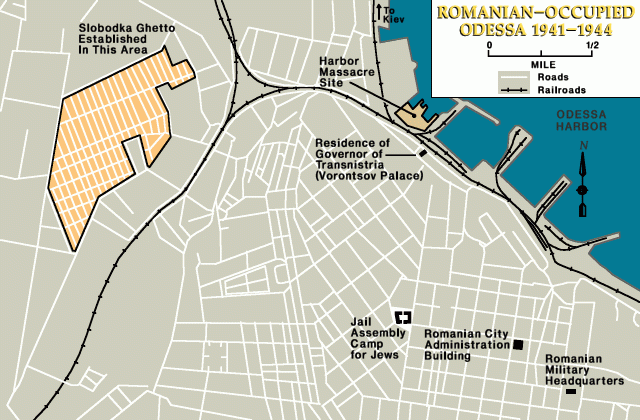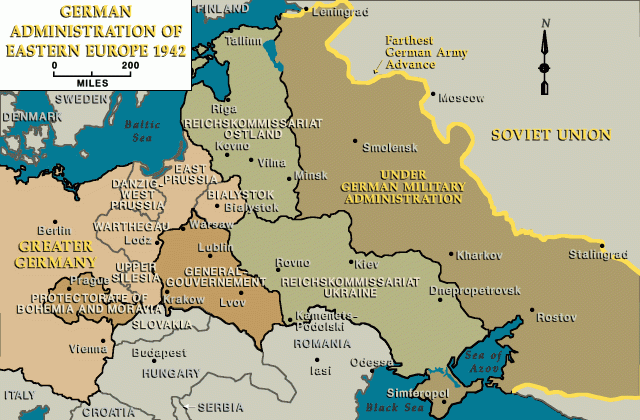
The Holocaust in Odesa
The Ukrainian city of Odesa was occupied by Romania, an ally of Nazi Germany, from October 1941 to the spring of 1944. Antisemitic policies in Odesa quickly escalated to mass murder. In the first weeks of the occupation, the Romanians murdered tens of thousands of Jews in Odesa and its suburbs. The remaining Jews were then deported from the city. Most were killed elsewhere on Romanian-occupied territory in late 1941 and the first half of 1942.
Key Facts
-
1
On the eve of World War II, Jews made up one-third of Odesa’s multiethnic population of about 600,000 people.
-
2
Romanian authorities occupied Odesa on October 16, 1941. Right away, they began to target Jews there. Jews were subjected to abuse, violence, detention, forced labor, deportations, and mass killings.
-
3
Within a year of Odesa’s occupation, the prewar Jewish community had been destroyed.
The Holocaust in Odesa began after German and Romanian soldiers occupied the city on October 16, 1941. In Odesa and other parts of Romanian-occupied Ukraine, Romanian anti-Jewish policies evolved quickly and chaotically. Many groups played a role in implementing the mass murder of Jews in Odesa. Romanians, Germans, and indigenous collaborators (including Russians, Ukrainians, and especially the significant local ethnic German population) were all involved.
Less than a week after the occupation began, Romanian authorities initiated a massacre, brutally killing at least 25,000 to 30,000 Jews in Odesa and its suburbs. The massacre lasted several days. Soon after, the Romanians sent approximately 25,000 to 30,000 Jews on a death march from Odesa to a camp in the village of Bohdanivka (called Bogdanovca in Romanian). Nearly all these Jews were massacred at the camp within six to eight weeks of arrival.
In December 1941, Romanian authorities decided to make Odesa free of Jews. During the first half of 1942, they deported Jews remaining in Odesa to sites of detention in rural areas. The majority were murdered in mass shooting operations there. In less than a year, Odesa’s once vibrant Jewish community was nearly destroyed.
Only a small number of Jews survived the Holocaust in Odesa, either as forced laborers or in hiding.
The Jewish Community of Odesa before World War II
The Jewish community of Odesa experienced a great deal of change in the decades before the Holocaust.
By the early 20th century, the Jewish community in this port city was one of the largest and most vibrant in eastern Europe. Odesa was a renowned center of Jewish culture and learning.
Since its founding in the late 18th century, Jews had made up a significant part of Odesa’s diverse population. Odesa was one of the few major cities in the Russian Empire where Jews were allowed to live. But like all Jews in the Russian Empire, Jews in Odesa were subjected to restrictions. Imperial authorities capped Jews’ attendance in schools and universities. These restrictions impacted what jobs Jews could hold. Jews also experienced anti-Jewish violence, including pogroms.
The lives of Jews in Odesa changed dramatically following the collapse of the Russian Empire in 1917 and the establishment of the Soviet Union in 1922. As a dictatorship, the Soviet regime maintained tight control over its citizens. This control made outbreaks of interethnic violence, such as pogroms against Jews, rare. As a communist state, the Soviet regime implemented policies that targeted people based on their social and economic status. These policies applied to all Soviet citizens, including Jews. The Soviet regime targeted wealthier people as so-called class enemies and confiscated their homes and businesses. The same policies led to new opportunities for poorer people. Jews, in particular, now had access to educational and career paths that had been unavailable to them. Regardless of their social and economic backgrounds, all Soviet citizens—including Jews—were vulnerable to persecution and even murder by the regime as real or perceived enemies.
Soviet policies put a strain on all ethnic, national, and religious communities, including Odesa’s Jewish community. Following communist principles, Soviet authorities closed many religious institutions. For Jews, this meant that most synagogues and religious schools were shut down, and that rabbis were targeted by the regime. The Soviets also targeted independent cultural and social organizations. As a result, many Jewish institutions including Yiddish-language libraries, theaters, and publishing houses were closed. Jewish communal life in Odesa virtually ceased to exist by the 1930s, despite the still large Jewish presence in the city. These same policies had a similar effect on other ethnic and national groups.
According to the 1939 Soviet census, about one third (roughly 200,000) of Odesans were Jews.
World War II Comes to Odesa
World War II began in Europe in September 1939 but did not come to Odesa for nearly two years. On June 22, 1941, Nazi Germany and its Axis allies, including Romania, attacked the Soviet Union. This military campaign was known as Operation Barbarossa.
One of the first signs of war in Odesa was the arrival of refugees, including Jews, from Bessarabia. As part of Operation Barbarossa, Romanian and German troops advanced rapidly into the regions of Bessarabia and Northern Bukovina. These regions of interwar Romania had been forcibly ceded to the Soviet Union in June 1940. After the launch of Operation Barbarossa, Romania quickly reincorporated the territories. In Bessarabia, Romanian authorities almost immediately targeted Jews with discriminatory measures, ghettoization, deportation, and mass murder. This prompted many Bessarabian Jews to flee east. Some went to Odesa before the Germans and Romanians focused their attention on capturing it.
Beginning in early August 1941, the Axis forces completely surrounded Odesa. Romanian troops set siege to the city. The Red Army (the Soviet military) continued to defend the city for more than two months.
The Romanians occupied Odesa on October 16, 1941. They designated it as the capital of the Transnistria Governorate. The Transnistria Governorate was a Romanian administrative unit that ruled over the part of occupied Soviet Ukraine between the Dniester and Southern Buh rivers. The governorate existed between 1941 and 1944. While Romanian authorities controlled the territory, Nazi German units were present in Odesa and surrounding areas.

Odesans Under Siege
Before the front lines reached Odesa’s outskirts, some civilians took the opportunity to flee the city. Others decided to remain in Odesa, because they believed that the Soviets would maintain control. Still others could not leave due to personal circumstances or because they did not have official permission from Soviet authorities.
After the Axis forces surrounded Odesa, civilians were trapped. The only way for them to escape and reach the Soviet-controlled mainland was by sea. However, German air attacks destroyed evacuation ships, further limiting people’s ability to flee.
By the time the Romanians occupied Odesa in mid-October, there were between 70,000 and 120,000 Jews trapped in the city. Some of these were local Jews. Others were Jewish refugees from Bessarabia who had fled Romanian brutality and sought refuge in Odesa.
The Beginning of the Holocaust in Odesa
Romanian authorities took control of Odesa on October 16, 1941. The following day, they ordered all Jews to register. The Romanians immediately began subjecting Jews in the city and surrounding areas to humiliation, arbitrary violence, and murder. In addition, Nazi antisemitic propaganda spread throughout the city.
On October 18, Romanian authorities converted a prison on Fontans’ka Street and the surrounding area into a detention site for Jews. They referred to this prison as a ghetto or a camp. They allowed the men, women, and children confined there to bring only a few necessities. The Romanians also made Jewish men perform forced labor in the city.
The persecution of Jews by the Romanian authorities quickly escalated. According to some memoirs, as well as investigations by Soviet authorities, mass violence and death in the Odesa area began as early as October 19. It is clear, however, that the violence escalated significantly beginning on October 22.
Prelude to Massacre: The Explosion on October 22, 1941
On the evening of October 22, 1941, an explosion rocked the Romanian military headquarters in Odesa. The blast killed more than 60 people. Among the casualties were the Romanian general in command of the city, members of the Romanian military, four German naval officers, and civilians. It was not clear who was responsible for the explosion. However, Romanian authorities blamed Jews and Communists. These two groups were often falsely linked together in antisemitic and anticommunist propaganda.
In response to the explosion, Romanian dictator Ion Antonescu ordered a brutal reprisal against Jews and Communists in Odesa. Romanian authorities largely perpetrated the resulting massacres. A limited number of German SS troops might have helped them.
The Massacre of Jews in Odesa: October 22–26, 1941
The explosion on October 22, 1941, was the catalyst for a dramatic and immediate acceleration in anti-Jewish violence. The Romanians began hanging Jews and Communists that same evening. These public executions continued into the following day. By the end of October 23, Romanian authorities had hanged an estimated 5,000 people, mostly Jews. The next day, Romanian authorities moved thousands of detained Jews to the nearby village of Dalnyk. The Romanians executed some Jews along the way. In Dalnyk, Romanian soldiers first shot a few dozen Jews in anti-tank ditches. They then confined the remaining Jews in large buildings variously referred to as barns, sheds, or warehouses. Romanian soldiers riddled these buildings with machine gunfire. This mass shooting continued into the following day. At some point, the Romanians set fire to several of the buildings. Romanian troops shot and killed anyone trying to escape the blaze.
On October 25, Romanian authorities used explosives to destroy at least one of the buildings in Dalnyk and kill the people inside. Antonescu had ordered this form of retaliation as a symbolic echo of the October 22 explosion. The exact number of victims murdered at Dalnyk is unknown. Scholars estimate that it was likely around 20,000 people.
Witnesses indicate that Romanian authorities carried out massacres at other sites as well, before and during the October massacre at Dalnyk. At a munitions depot on Lustdorf Road, many victims were killed in mass shooting actions. Others were burned alive in artillery warehouses.
The Jews who were not killed in the massacre at Dalnyk were taken to a newly created ghetto in the Odesa neighborhood of Slobidka. They were among the estimated 25,000 Jews confined there on October 25. The conditions in Slobidka were harsh. Jews experienced overcrowding, hunger, and severe exposure to the cold.
Atrocities Committed by German Forces in Odesa (October–November 1941)
In addition to the Romanian troops stationed in Odesa, Sonderkommando 11b of the German Einsatzgruppe D operated there for a limited time. Sonderkommando 11b remained in Odesa from October 17 to mid-November 1941. On October 23, the German unit shot an unknown number of Jews from the Fontans’ka Street prison. They carried out another, larger mass shooting operation, likely also in late October. Through mid-November, this unit routinely searched for and executed Jews in the city.
It is estimated that Sonderkommando 11b murdered between 1,000 and 5,000 Jews in Odesa.
The Death March to the Bogdanovca Camp
Romanian authorities continued their violent assault on Jews in Odesa after the October massacre. Starting on October 27, Romanian gendarmes marched groups of thousands of Jews from Odesa to the Romanian-established Bogdanovca camp. This camp was located in the Ukrainian village of Bohdanivka some 160 kilometers (100 miles) away. Scholars estimate that the Romanians forced a total of 25,000 to 30,000 Jews to make the journey on foot over the next few weeks.
Along the way, the Jews suffered from a lack of food and water, as well as exposure to cold temperatures. They also endured theft and violence from the gendarmes and members of the local police who helped escort the convoys.
At the Bogdanovca camp, Romanian authorities crowded the surviving Jews into the pigsties and barns of a very large state-owned farm (radhosp). They also held there Jews from elsewhere in the Transnistria Governorate, as well as from Bessarabia and Bukovina. Thousands of Jews died from hunger and disease due to the inhumane conditions at the Bogdanovca camp.
Between December 21, 1941, and mid-January 1942, tens of thousands of Jews were killed in mass shooting operations at Bogdanovca. These shootings occurred in practice under both Romanian and German authority. Some shooters were members of local ethnic German militia units called Selbstschutz. These units operated under the de facto authority of a special SS unit. Other shooters were members of indigenous Ukrainian police units operating under the authority of Romanian gendarmes. The perpetrators burned the corpses of the people they had massacred. They also burned alive between 2,000 and 5,000 Jews who were too frail or elderly to walk to the mass shooting site. Plunder of Jewish-owned property was widespread during the massacre.
Nearly all of the Jews forcibly marched from Odesa to the Bogdanovca camp died or were murdered.
Making Odesa “Free of Jews”

The Romanians continued to subject Jews in Odesa to random acts of violence in the weeks following the October massacre and the forced march to the Bogdanovca camp. According to some survivor testimonies, it was during this period that the Romanians began to require Jews in Odesa to wear yellow star badges on their clothing.
By mid-December 1941, Romanian authorities estimated that there were approximately 44,000 Jews in Odesa. In late December, Romanian dictator Ion Antonescu decided that Odesa should be free of Jews. He and other Romanian leaders believed in Judeo-Bolshevism, a conspiracy theory that blamed Jews for Communism. They considered Jews in the Soviet Union to be particularly dangerous enemies. In 1941, the Romanians feared that Jews in Odesa would help the Red Army (Soviet military) retake the city if given the chance.
Acting on Antonescu’s orders, Gheorghe Alexianu, Transnistria’s governor, issued an order to deport Odesa’s remaining Jews to rural areas of the Transnistria Governorate.
On January 10, 1942, Romanian authorities ordered all Jews still in Odesa to assemble in the Slobidka ghetto within two days. The ghetto served as an assembly and transit point for deportations of Jews from Odesa to other parts of Transnistria, mostly Berezovca county (Berezivka, in Ukrainian).
Deportations by Train from Odesa, 1942
Romanian authorities began deporting Jews from Odesa by train to Berezovca county, located some 90 kilometers north of Odesa.
Romanian gendarmes and sometimes German guards carried out the roundups and deportations from Odesa. They marched groups of Jews more than 10 kilometers (6 miles) from the Slobidka ghetto or from other assembly points to a train station. There, larger groups of Jews, ranging from a few dozen to about two thousand, were crowded into railcars for the journey to the city of Berezivka. A few transports went to other destinations.
The Romanians deported more than 31,000 Jews from Odesa in January and February 1942. Temperatures were well below freezing and conditions were deadly. These conditions were made even worse by the rampant theft of Jews’ personal belongings, including their outerwear. As a result, up to a quarter of the deportees froze to death before or during the journey.
Smaller-scale deportations of Jews from Odesa continued from March through June. By April 1942, only 701 registered Jews remained in the city. On June 10, 1942, the Slobidka ghetto was closed. The last deportation train left Odesa on June 23.
Massacre by Ethnic German Militia Units
Upon their arrival in Berezivka, Romanian gendarmes and Ukrainian police marched the majority of the Jewish deportees toward makeshift camps in villages along the Buh River. Many Jews died en route to these destinations.
Ethnic German militia units (Selbstschutze) often intercepted these marches. They imprisoned the Jews for a time and robbed them of any remaining valuables. They then killed them in mass shooting operations at sites around Berezovca county. The ethnic German militia units conducted dozens of these massacres. They killed from 30 to 1,000 Jews at a time. The largest-scale operations took place between January and March 1942. Militia members then burned the victims’ bodies.
Between January and June 1942, ethnic German militia units, primarily in Berezovca county, murdered around 33,500 Jews deported by the Romanian authorities from Odesa.
A Remnant of Jews in Odesa
By the end of June 1942, there were almost no registered Jews left in the city of Odesa. The Romanians later brought a small number of Jews, mostly craftsmen, into the city. These craftsmen served as forced laborers in government workshops. In January 1943, 54 Jewish forced laborers—including men, women, and children—lived in Odesa.
An estimated 1,000 Karaite Jewish families lived openly in Odesa throughout the Romanian occupation. The Karaites were a small sect of Judaism with religious practices that differed from most Jews in eastern Europe. The Nazis considered Karaites to be of Turkish origin, and therefore did not target them for persecution or mass murder. Romanian authorities in Transnistria apparently adopted the same policy.
In addition, an unknown number of Jews who were not officially registered remained in Odesa. These Jews were often in hiding or living under false identities.
Jews in Hiding in Odesa
During their occupation of Odesa, the Romanians killed or deported nearly all Jews in the city. A small number survived in hiding. Vera Bakhmutskaia, a Jewish Odesan who had survived in hiding with the help of a non-Jewish family friend, recognized how incredible her survival was:
There were very few of us [Jews] left. Very few. When the Romanians withdrew [...] I was walking in the street and it seemed to me that I was the only Jew left in the city.
A small number of Jews hid or lived under assumed non-Jewish identities. Attempts to escape deportation and likely death by hiding in the city were difficult and rarely successful. Jews attempting to hide on their own had to search for food and shelter without getting caught. Non-Jews who tried to help them faced great personal risk, as well as the practical difficulties of secretly providing shelter, food, and clothing. Denunciations of both Jews in hiding and the non-Jews helping them occurred throughout the period of the occupation.
God forbid that anybody would learn [of me being Jewish ...] If they knew, they would have denounced me immediately. … [... But] there were [also] people who were very humane, very nice, those who helped us.
In the decades since the end of the war, dozens of non-Jews who helped Jews in Odesa have been formally recognized by Yad Vashem as “Righteous Among the Nations.”
The Aftermath of the Romanian Occupation of Odesa
The Romanians withdrew from Transnistria in March 1944. They left the territory under German control. The Red Army (the Soviet military) retook Odesa from the Germans on April 10, 1944.
Two months later, Soviet authorities conducted a registration of Odesa’s residents. It became clear that the occupiers had decimated the Jewish community—from roughly 200,000 in 1939 to 2,640 in 1944.
As the Red Army reconquered territory, Soviet authorities investigated a variety of crimes committed by the occupiers. They investigated crimes committed against Jews, in Odesa and elsewhere. Soviet authorities used this evidence in trials against captured Axis perpetrators and local collaborators.
Investigations of prominent officials occurred in Romania after the fall of wartime dictator Ion Antonescu. The former governor of Transnistria, Gheorghe Alexianu, was found guilty by the People’s Tribunal in Bucharest. The Romanians executed him on June 1, 1946, for a number of crimes, including those he committed against Jews in Odesa.
Memorializing the Holocaust in Odesa
Near the end of World War II, Jews in many communities across the Soviet Union attempted to publicly memorialize the murder of their families and friends. Soviet authorities, however, generally opposed efforts to single out a particular group of victims. When the Soviet regime built memorials to commemorate the dead, the dedications included phrases such as “peaceful civilians,” “Soviet citizens,” or “Soviet people.” This was the case even if Jews were the majority of the victims at a given site. This language obscured the full extent of the tragedy that is now known as the Holocaust. Nevertheless, some Jewish communities managed to build memorials thanks to relationships with Soviet officials and informal agreements or exchanges. But in Odesa, efforts to create a monument failed for many decades during the Soviet period.
After the collapse of the Soviet Union in 1991, independent states emerged and Soviet-era restrictions on memorialization became irrelevant. This offered new opportunities to memorialize the Holocaust and other mass atrocities. Since the 1990s, monuments to Holocaust victims have multiplied throughout the region, including in Ukraine.
In and around Odesa, monuments or plaques memorializing Holocaust victims can be found at several locations. These locations include Dalnyk, Slobidka, and the site of the former artillery warehouses on Lustdorf Road. The former Bogdanovca camp and other sites of mass murder also have memorials. In 2009, a Holocaust museum opened in Odesa.
Since 2004, people who helped Jews in Odesa during the war have been recognized by an “Alley of the Righteous” located at Prokhorovskyi Square. Trees line this space, and a plaque lists the names of those honored by Yad Vashem as “Righteous Among the Nations.”
Footnotes
-
Footnote reference1.
The Selbstschutz (lit. “self-protection units”) militia units had been created by a special German SS formation (Sonderkommando Russland). As of August 1942, this SS unit was officially responsible for the Selbstschutz militias, based on a formal agreement with the Romanian occupation authorities. Prior to this agreement, the lines of authority were less established, but it is clear that in practice the SS controlled these militias.
-
Footnote reference2.
Interview with Vera Bakhmutskaia, Visual History Archive, USC Shoah Foundation, May 17, 1998, segment 54; 23:38.
-
Footnote reference3.
Interview with Vera Bakhmutskaia, Visual History Archive, USC Shoah Foundation, May 17, 1998, segment 54; 23:10.




